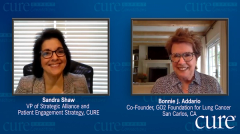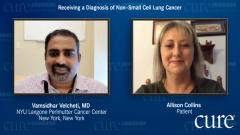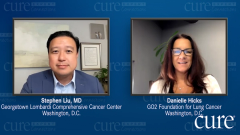
Resources and Tools for Non-Small Cell Lung Cancer
Ms. Addario, lung cancer survivor, encourages patients with non-small cell lung cancer to use all the resources and tools that are available to them.
Episodes in this series

Sandra Shaw: A patient has spent time waiting for the test, educating themselves, empowering themselves. Once they get the results, what questions do they need to ask? Is there any advice you give them about what that conversation looks like? Everyone talks about shared decision-making. What does that look like?
Bonnie Addario: Eighty percent of patients with cancer are treated in community hospitals, and most of these folks just don’t have the time. Not all of them have facilitators working for them to help the patients navigate the things you’re asking about. People come to our “living room,” and they make friends with other patients. We have a buddy system at GO2; we put people together. That’s where they get all their information. That’s another source. But if you want it, we can show you how to get there. So can all these other amazing foundations out there that do such good work.
Sandra Shaw: You mentioned all the tools in the toolbox. How do patients make sure their doctor is offering all the tools available?
Bonnie Addario: That’s the question to ask. I was talking to someone the other day, and they said they have a targeted marker. I want all the things in the lung cancer toolbox. I want you to throw them all at me and give me an opportunity to be tested for everything. When physicians don’t use all the tools in the toolbox, they’re doing the patient a serious unjust. It’s not OK. You look at a fellow or a lady who goes out in the morning to build a house. She’s got a toolbox. She’s got a hammer and nails and all these things. You can’t build a house with just a hammer. You need the nails too—you need all those things. Think in those terms: What should be in the toolbox? Everything should be in the toolbox. That’s going to get you where you need to be, which is much longer life.
Sandra Shaw: All the education they can do, all the resources you’ve shared, and buddying up with other patients with lung cancer—their networks can help them through this experience. This is all great information for the newly diagnosed patients. Thank you so much for all of that. You did mention progression earlier, and sometimes that is the reality. There is progression after treatment. Can you talk about testing a little in the setting of progression?
Bonnie Addario: Absolutely. It’s very similar to doing all the testing you do when you’re first diagnosed. You have to do all that over again to see what’s driving your cancer now. For the most part, we’ve been able to keep up with it in such an amazing way that there’s an alternative. Sometimes it is a clinical trial. But when I was going through my experience, there weren’t any targeted markers. The EGFR marker was in a clinical trial for a drug that Genentech had. But it was never there for me because I needed to go on treatment and couldn’t wait for the clinical trial. Now it’s different. I couldn’t have had this discussion three years ago. I couldn’t have said all the things I just said. It’s such a hopeful time for patients with lung cancer. But the important thing is that we get them to the right doctor, and we get the right doctor using all the tools in the box. They have an opportunity to live much longer.
Sandra Shaw: Absolutely. It’s amazing. We’ve gone from two markers to 10 markers in just a few years. Survival is finally moving in the right direction.
Bonnie Addario: There are some amazing researchers in some of the top hospitals who we’re working with, who are going beyond that. Taking tissue and blood that we collect and sending it to them—they’re running 300 genes. They’re looking to see genes that are in other cancers that might very well be found in lung cancer as well. There’s so much work being done.
Sandra Shaw: Thank you for all this great information, Bonnie, and for providing so much hope and inspiration to patients with lung cancer. Are there any other words of wisdom you’d like to share with patients before we close about biomarker testing or getting results?
Bonnie Addario: I just want to tell them how unique they are. If you talk to one patient and they have this drug or that drug, that doesn’t mean you’re being left out. There’s something there for you. We just have to find it. But one size does not fit all in any way, shape, or form.
Sandra Shaw: Thank you very much.
Bonnie Addario: You’re welcome. Anytime.
Transcript edited for clarity.







